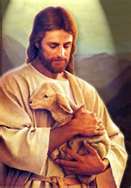Second Sunday in Ordinary Time – Cycle B (Jn 1:35-42)

Jesus, Lamb of God
For me, personally, January 16th marks another anniversary; for on that date 27 years ago I received a phone call informing me that my parents had been killed in an automobile accident. I have spoken of this before and won’t elaborate today on their all too early deaths. Rather, I wish to speak of someone who was passionately in love with words, both written and spoken. For my mother, words were the essential vehicle for conveying ideas, discerning concepts, and understanding the world around us.
I am told that the average person has a vocabulary of about 10,000 words. The Second Edition of the 20-volume Oxford English Dictionary contains approximately 250,000 words. I tell you this because I honestly believe that my mother knew most—if not all—of those 250,000 words. As children, we used to challenge her by trying to find the most obscure and difficult words and then asking her to tell us what they meant and how to spell them. I cannot recall ever winning at that game; she was simply that good. She was a marvelous reader, reading books to each of us from cradle to when we could read on our own and she instilled in each of us a love for prose that is, sadly I believe, very rare these days. She was also an award winning journalist and gifted writer. I suppose that is where I get my love for the language, the reading and the writing, the teaching and the telling.
This past Friday evening I listened to Dr. Marti Jewell speak at our Diocesan conference. She spoke of the emerging model of church and the changes that are happening in our parishes. She mentioned that from her research she found that parish communities were hungry—really hungry—for greater understanding of their faith, for having the opportunity to learn what it all means and for how to defend it when called upon to do so.
At a couple of meetings recently, I listened as the speaker was discussing a number of topics for future discussion and as I looked around the room I saw faces that looked like ‘deer in the headlights.’ They were nodding their heads as if they understood—but their eyes were glazed over—and they truly had no clue as to what was being said. This became painfully obvious when, after some moments had passed, one of the attendees raised their hand and asked what Christological meant. I have been present when words like exegesis, apologetics, and hermeneutical were spoken as if they were common words that anyone would understand.
Now I do not know whether you know what Christological, exegesis, apologetics, or hermeneutical mean, but I will tell you what my mother would tell us when we failed to recognize a word and its meaning. She would point to the very large dictionary that we owned and say “Look it up.”
But, I believe, beyond the “big and unfamiliar words” lies a far more fundamental problem. As community and church, we often do not have a solid grasp of what it is exactly that we do believe. We certainly don’t know what we don’t know, we know what we know without understanding, and in truth we often do not understand what we believe we do know. And to make matters even worse, we almost never ask even the simplest of questions. We may be hungry for the truth but we are reluctant to come to the table to satisfy our hunger.
Jesus almost always asked simple questions didn’t he? We heard him today ask two disciples of John one of the most fundamental questions of life, “What are you looking for?” What were they looking for; what were they aiming to get out of life? And he is asks us the same question “What are you looking for?” Jesus invites us to come and see, to ask, to discover for ourselves what He is all about, what God is all about; it is a personal invitation to build a closer relationship with the One who made us in love to love and for love.
Once when an elderly gentleman was being admitted to a hospital, he was asked, “What is your religious preference?” The man looked at the nurse and replied, “I am awfully glad you asked me that. I have always wanted to be a Catholic, but nobody has asked ever me that before.”
Andrew’s sharing of his faith in Jesus in the Gospel today, and the old man’s response, are reminders that in order to respond to the question “What are you looking for?” we must ask questions of our own and proactively discover the richness and depth of our faith.
In the coming months each of us will have opportunities to satisfy our hunger for a deeper, richer, more satisfying understanding of our faith. But we must be open and willing to participate in dialog and community forums when they are provided. We must actively seek the answers; we cannot sit back and expect understanding to come to us without any effort.
Jesus gave us our instructions when he said “Ask and it will be given to you; seek and you will find; knock and the door will be opened to you. For everyone who asks, receives; and the one who seeks, finds; and to the one who knocks, the door will be opened.”
Jesus commands us to ask, seek, and knock in order to know him. For us to answer the question “What am I looking for?” we must, as my mother would say, “Look it up.”
